Journal Entry from 6/18/19 – Rome, Italy
Yesterday, we went to the Forum, Colosseum, and Palatine Hill. It was a long, hot day full of crowds, wandering, and wondering.
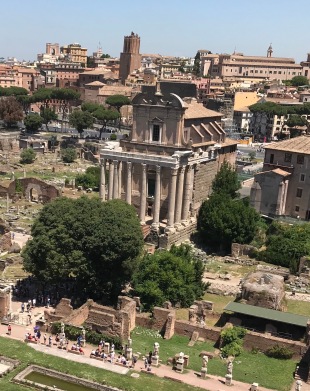 When we were looking down into the Forum from the Palatine Hill, Mitch pointed out a pair of green doors on a church much higher than the base of the ancient columns in front of it. Apparently, the church was built much later, after the Forum had been mostly buried under centuries of rubble and neglect. He said it was even referred to as the “cow field” for a while, years after being the center of Roman life. They only began excavating it all slowly, but surely, a few centuries ago.
When we were looking down into the Forum from the Palatine Hill, Mitch pointed out a pair of green doors on a church much higher than the base of the ancient columns in front of it. Apparently, the church was built much later, after the Forum had been mostly buried under centuries of rubble and neglect. He said it was even referred to as the “cow field” for a while, years after being the center of Roman life. They only began excavating it all slowly, but surely, a few centuries ago.
Mitch said they’ve done a lot more to plant grass and continue the excavations since he first started coming to Rome 25 years ago. To be honest, I don’t remember much about the Forum from when I last came, other than it’s position between the Colosseum and the “Wedding Cake” monument.
When we walked on to the Colosseum, and were finally let in at our appointed time, we were already weary and dusty. Mitch and I had been up since 4:45 a.m. and Grace’s knee was struggling after all the stairs from the Palatine Hill. We walked through it all relatively quickly, but not before seeing an exhibit on the various iterations of the Colosseum.
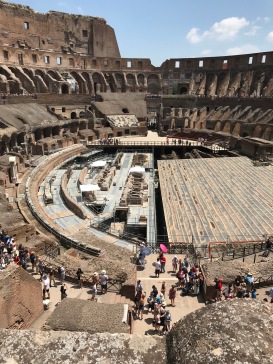 While starting as a symbol of Rome’s grandeur in the 1st century A.D., full of gladiator combat and man vs. beast tests of will, it began to decline with alongside the might of Rome. Over time, fires, earthquakes, and raiding took their toll on it’s once grand physique. The last recorded events in the ancient Colosseum were in the 5th century.
While starting as a symbol of Rome’s grandeur in the 1st century A.D., full of gladiator combat and man vs. beast tests of will, it began to decline with alongside the might of Rome. Over time, fires, earthquakes, and raiding took their toll on it’s once grand physique. The last recorded events in the ancient Colosseum were in the 5th century.
After that, the Colosseum took on many iterations. It housed a church and later was sanctified as a shrine to martyred Christians. It was a giant graveyard. It was converted into markets and rented housing. It served briefly as a fortified castle. And now, it is being gently preserved as a symbol of Rome’s rich history as a great empire.
I saw an Italian mother talking to her toddler daughter about a fully decorated model of the Colosseum at the exhibit. It made me wonder what it’s like to come from a country, and a city really, that once dominated the known world. How does that impact your sense of history? How does that impact your sense of self? How does that make you feel about the current state of Italy and it’s place in the world? Do you wish you were born during Rome’s heyday?
What will be our Colosseums, or will we have any? And what kind of lives will our cherished places lead long after we are gone, and what lives had they led long before we were there?
It also made me wonder about the period of time and place into which I’ve been born. How will future Americans remember our world and the choices we’ve made as a dominant power? What will be our Colosseums, or will we have any? And what kind of lives will our cherished places lead long after we are gone, and what lives had they led long before we were there?
The Forum and Colosseum were a great reminder that time is the great equalizer. Each people, or place, will have their day in the sun, as well as their time to be forgotten. Our young country has yet to learn what the more mature ones have learned. History is about surviving and adapting to the changes and challenges around us. Just like the Colosseum has been mighty and humbled many times, likely we too shall be.

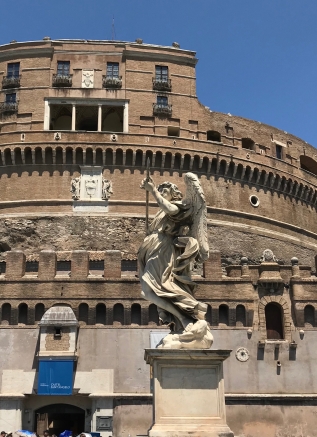 . The last angel on the bridge held a spear in a fearsome pose, as if guarding the fortress by himself. My mind started asking a million questions. How did the fortress stay in the church’s hands if the Vatican area close by fell? Would they just hunker down there and beg other Catholic countries to come save them? How much food did they keep there regularly, and for how long could they hold out? Mitch later showed us the passage the pope would use to escape to the fortress from the Vatican, high above the crowds below.
. The last angel on the bridge held a spear in a fearsome pose, as if guarding the fortress by himself. My mind started asking a million questions. How did the fortress stay in the church’s hands if the Vatican area close by fell? Would they just hunker down there and beg other Catholic countries to come save them? How much food did they keep there regularly, and for how long could they hold out? Mitch later showed us the passage the pope would use to escape to the fortress from the Vatican, high above the crowds below.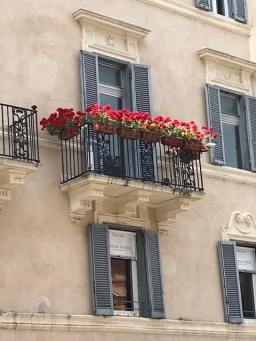 Later, she was joined by a cacophony of other birds beginning their morning rounds – some more pleasant than others. So, I wearily joined them in their greeting of the day, a strange role reversal since Mitch was still asleep.
Later, she was joined by a cacophony of other birds beginning their morning rounds – some more pleasant than others. So, I wearily joined them in their greeting of the day, a strange role reversal since Mitch was still asleep.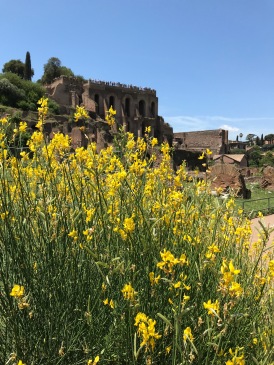 Later, when walking through the city, it dawned on me that I was last here in November, not June, and so I saw a very different place. The Rome of summer is vibrant with color. Green ivy crawls up the sides of posh hotels and ancient columns. Bright red and pink flowers can be found throughout the city decorating window boxes of third floors, hanging off of black wrought iron terraces. Yellow flowers punctuate the walk along the ancient Forum roads.
Later, when walking through the city, it dawned on me that I was last here in November, not June, and so I saw a very different place. The Rome of summer is vibrant with color. Green ivy crawls up the sides of posh hotels and ancient columns. Bright red and pink flowers can be found throughout the city decorating window boxes of third floors, hanging off of black wrought iron terraces. Yellow flowers punctuate the walk along the ancient Forum roads.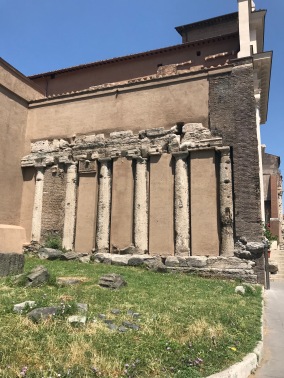 I now understand that Rome held secrets I wasn’t ready for at 19. Life can’t be planned like the gridded layout of a flat Oklahoma town. Having a rich history means sometimes tearing down or building around the old, appreciating the ruins from your life that serve as reminders of better times to inspire hope, or of darker times to keep you from repeating past mistakes.
I now understand that Rome held secrets I wasn’t ready for at 19. Life can’t be planned like the gridded layout of a flat Oklahoma town. Having a rich history means sometimes tearing down or building around the old, appreciating the ruins from your life that serve as reminders of better times to inspire hope, or of darker times to keep you from repeating past mistakes.